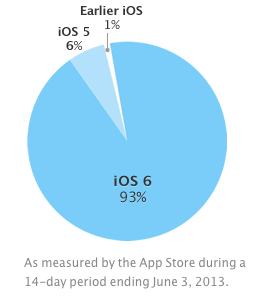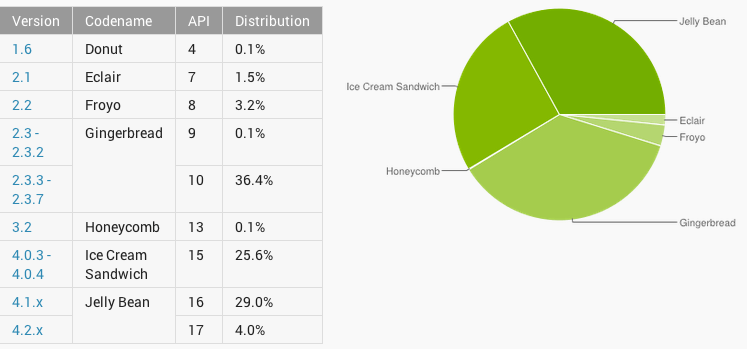Mirroring a similar initiative by Google -- and perhaps intended as a swipe at Android -- Apple has started charting the state of iOS fragmentation on its public developer page. The data, collected from Apple’s App Store during the 14-day period ending June 3, is quite telling. Only one percent of devices are still running a version older than iOS 5, released in October 2011, while 6% are currently on iOS 5 and 93% run the most recent iOS 6.
 Being able to run the latest operating system on devices over three years old is big plus for many users -- even if not all features are carried over due to hardware limitations. But it’s also a major deal for developers who can focus their efforts on supporting the latest iOS version knowing nearly everyone will be able to take advantage of its features.
Being able to run the latest operating system on devices over three years old is big plus for many users -- even if not all features are carried over due to hardware limitations. But it’s also a major deal for developers who can focus their efforts on supporting the latest iOS version knowing nearly everyone will be able to take advantage of its features.
Android fragmentation has long been an issue for Google’s platform for a number of reasons. From manufacturers adopting the software and layering their own UI on top, to carriers enforcing bloatware on devices and restricting updates. Another reason is the fact that Android has a big install base on lower-end handsets and feature phones, not just high-end hardware, thus many of them are unable to handle the latest OS version.
But it’s getting better. According to the latest data from the same 14-day period ending June 3, Android 4.1 and 4.2 “Jelly Bean” are finally getting close to overtaking Gingerbread at 33% versus 36.5% for the aging release.
Another way Google is addressing the issue involves releasing ‘pure’ Android variants of the most popular handsets on the market. Aside from their own Nexus 4, they’ve already announced pure Android versions of the Samsung Galaxy S4, HTC One, and rumors suggest the Sony Xperia Z is next in line. The phones run the latest 4.2.2 version of Google’s mobile OS and should receive future updates as they become available.
